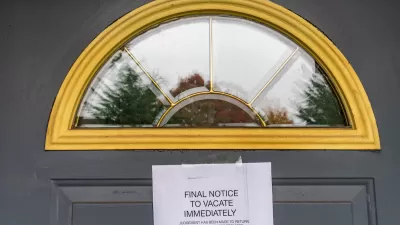Federal prosecutors are charging a software company with using algorithms to artificially inflate rents.

In an article for CALmatters, Wendy Fry explains how property owners are increasingly using the same AI tool to set rents in what federal prosecutors are calling “an unlawful information-sharing scheme.”
Many landlords now use a single company’s software — which uses an algorithm based on proprietary lease information — to help set rent prices.
“The illegally maintained profits that result from these price alignment schemes come out of the pockets of the people that can least afford it,” said California Justice Department spokesperson Elissa Perez.
In California and across the country, city leaders are taking action to prohibit the practice. In July, San Francisco became the first city to ban “the sale or use of algorithmic devices to set rents or manage occupancy levels.” Last month, Philadelphia passed a similar ban. San Diego and San Jose are considering their own ordinances. While a proposed state bill that would have banned algorithmic price-setting failed to make it through the legislature this year, the lawmaker who introduced it says she will bring it back in the next session.
Meanwhile, a federal antitrust suit charges the company, RealPage, with enriching itself and landlords at the expense of renters by artificially inflating prices. Federal officials say the company controls 80 percent of commercial revenue management software.
FULL STORY: Landlords are using AI to raise rents — and California cities are leading the pushback

Maui's Vacation Rental Debate Turns Ugly
Verbal attacks, misinformation campaigns and fistfights plague a high-stakes debate to convert thousands of vacation rentals into long-term housing.

Planetizen Federal Action Tracker
A weekly monitor of how Trump’s orders and actions are impacting planners and planning in America.

San Francisco Suspends Traffic Calming Amidst Record Deaths
Citing “a challenging fiscal landscape,” the city will cease the program on the heels of 42 traffic deaths, including 24 pedestrians.

Defunct Pittsburgh Power Plant to Become Residential Tower
A decommissioned steam heat plant will be redeveloped into almost 100 affordable housing units.

Trump Prompts Restructuring of Transportation Research Board in “Unprecedented Overreach”
The TRB has eliminated more than half of its committees including those focused on climate, equity, and cities.

Amtrak Rolls Out New Orleans to Alabama “Mardi Gras” Train
The new service will operate morning and evening departures between Mobile and New Orleans.
Urban Design for Planners 1: Software Tools
This six-course series explores essential urban design concepts using open source software and equips planners with the tools they need to participate fully in the urban design process.
Planning for Universal Design
Learn the tools for implementing Universal Design in planning regulations.
Heyer Gruel & Associates PA
JM Goldson LLC
Custer County Colorado
City of Camden Redevelopment Agency
City of Astoria
Transportation Research & Education Center (TREC) at Portland State University
Jefferson Parish Government
Camden Redevelopment Agency
City of Claremont





























